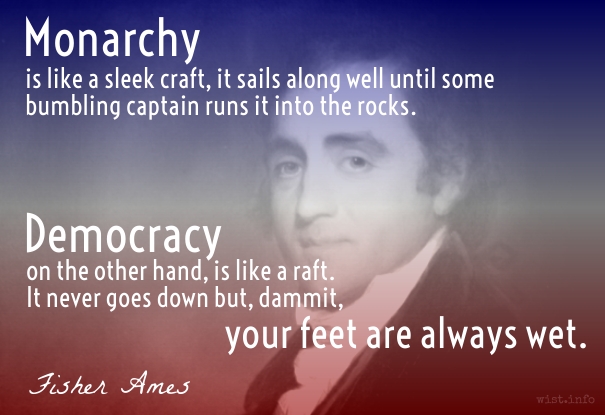France was long a “Despotism tempered by Epigrams.”
Thomas Carlyle (1795-1881) Scottish essayist and historian
The French Revolution: A History, Part 1, Book 2, ch. 4 (1.2.4) (1837)
(Source)
Though given in quotation marks, Carlyle is apparently "quoting" himself.
This quotation is commonly given on its own, though, since Carlyle's thesis at this point in his history is that the royal government had largely become irrelevant in the nation, he continues:
... and now, it would seem, the Epigrams have got the upper hand.
[Source]
Quotations about:
autocracy
Note not all quotations have been tagged, so Search may find additional quotes on this topic.
Never let yourself be persuaded that any one Great Man, any one leader, is necessary to the salvation of America. When America consists of one leader and 143,000,000 followers, it will no longer be America. Truly American leadership is not of any one man. It is of multitudes of men — and women.
Dwight David Eisenhower (1890-1969) American general, US President (1953-61)
“An Open Letter to America’s Students,” Reader’s Digest (1948-10)
(Source)
Quoted in different locations with various numbers for the US population. The letter was written while Eisenhower was President of Columbia University.
What has ever been granted to the countless millions of workers of Earth without a fight? Czar Nicholas has discovered that he is not all Russia. Will he “let the voice of the people be heard”? Was it argument or force that changed Czar Nicholas’s mind? Well , the Russian people have gotten the thin edge of the wedge in; let them keep striking hard, they will split the throne after a while.
Lucy Parsons (1851-1942) American labor organizer, anarchist, orator [a.k.a. Lucy Gonzalez]
“On Revolution in Russia and Chinese Use of the Boycott,” The Liberator (3 Sep 1905)
(Source)
If we could learn to look, instead of gawking,
We’d see the horror in the heart of farce.
If only we could act, instead of talking,
We wouldn’t always end up on our arse.
This is the thing that nearly had us mastered;
Don’t yet rejoice in his defeat, you men!
Although the world has stood up and stopped the bastard,
The bitch that bore him is in heat again.[Ihr aber lernet, wie man sieht statt stiert
Und handelt, statt zu reden noch und noch.
So was hätt einmal fast die Welt regiert!
Die Völker wurden seiner Herr, jedoch
Dass keiner uns zu früh da triumphiert —
Der Schoß ist fruchtbar noch, aus dem das kroch.]Bertolt Brecht (1898-1956) German poet, playwright, director, dramaturgist
The Resistible Rise of Arturo Ui [Der Aufhaltsame Aufstieg des Arturo Ui], Epilogue (1941) [tr. Tabori (1963)]
(Source)
Original German. The end of the play, after the violent death of the gangster Ui, modeled after the rise of Hitler. It was not performed until 1958 (German), 1960 (English). The above is the translation first used on Broadway (1963).
The last three lines are in the credits of the Sam Peckinpah (dir.) film Cross of Iron (1977).
Alternate translations:
Therefore we learn how to see and not to gape.
To act instead of talking all day long.
The world was almost won by such an ape!
The nations put him where his kind belong.
But don't rejoice too soon at your escape --
The womb he crawled from is still going strong.
[tr. Manheim (1981)]
The last four lines of Manheim's version were quoted by a vampire in the final episode of the first series (UK) of Being Human (2008).
Learn how to face the facts you tried to shun.
And how to act, where once you idly slept.
That's how the world was going to be run!
The nations duly mastered it, except
(In case you think the battle has been won) --
The womb is fertile still from which that crept.
[tr. Willett]
That was similar to the quatrain Willett translated (1998) from the portion of that that Brecht used in his War Primer [Kriegsfibel] (1947):
That’s how the world was going to be run!
The other nations mastered him, except
(In case you think the battle has been won) --
The womb is fertile still from which that crept.
Something like that almost governed the world.
Yet the people mastered him. But
I wish you'd hold your triumph:
The womb is fertile still from which that crawled.
[Another Kriegsfibel trans.]
Let none of us exult too soon: the womb is fertile still from which this monster crawled.
[Notes from Brecht in the notes for José Limón's unfinished memoir]
Do not applaud quite so soon, for the womb is fertile still from where this one crawled.
[Source]
It would seem … that man has been shocked by the war into forgetting how to be a political animal. This suspicion is confirmed by the spread of Fascism, which is a headlong flight into fantasy from the necessity for political thought. There is nothing more obvious about the post-war situation than that it is novel, springs from causes which have not yet been analysed, and cannot be relieved until this analysis is complete and has been made the basis of a new social formula. Yet persons supporting Fascism behave as if man were already in possession of principles which would enable him to deal with all our problems, and as if it were only a question of appointing a dictator to apply them.
Rebecca West (1892-1983) British author, journalist, literary critic, travel writer [pseud. for Cicily Isabel Fairfield]
“The Necessity and Grandeur of the International Ideal” (1934)
(Source)
When after the destruction of Brutus and Cassius there was no longer any army of the Commonwealth, when Pompeius was crushed in Sicily, and when, with Lepidus pushed aside and Antonius slain, even the Julian faction had only Cæsar left to lead it, then, dropping the title of triumvir, and giving out that he was a Consul, and was satisfied with a tribune’s authority for the protection of the people, Augustus won over the soldiers with gifts, the populace with cheap corn, and all men with the sweets of repose, and so grew greater by degrees, while he concentrated in himself the functions of the Senate, the magistrates, and the laws.
He was wholly unopposed, for the boldest spirits had fallen in battle, or in the proscription, while the remaining nobles, the readier they were to be slaves, were raised the higher by wealth and promotion, so that, aggrandised by revolution, they preferred the safety of the present to the dangerous past.
Nor did the provinces dislike that condition of affairs, for they distrusted the government of the Senate and the people, because of the rivalries between the leading men and the rapacity of the officials, while the protection of the laws was unavailing, as they were continually deranged by violence, intrigue, and finally by corruption.
[Postquam Bruto et Cassio caesis nulla iam publica arma, Pompeius apud Siciliam oppressus, exutoque Lepido, interfecto Antonio, ne Iulianis quidem partibus nisi Caesar dux reliquus, posito triumviri nomine, consulem se ferens et ad tuendam plebem tribunicio iure contentum, ubi militem donis, populum annona, cunctos dulcedine otii pellexit, insurgere paulatim, munia senatus, magistratuum, legum in se trahere, nullo adversante, cum ferocissimi per acies aut proscriptione cecidissent, ceteri nobilium, quanto quis servitio promptior, opibus et honoribus extollerentur ac novis ex rebus aucti, tuta et praesentia quam vetera et periculosa mallent. Neque provinciae illum rerum statum abnuebant, suspecto senatus populique imperio ob certamina potentium et avaritiam magistratuum, invalido legum auxilio, quae vi, ambitu, postremo pecunia turbabantur.]
Tacitus (c.56-c.120) Roman historian, orator, politician [Publius or Gaius Cornelius Tacitus]
Annals Book 1, ch. 2 [tr. Church & Brodribb (1876)]
(Source)
Alt. trans.:After the deaths of Brutus and Cassius had disarmed the people, with Sextus Pompeius crushed off Sicily (in the naval defeat off Pelorum, 36BC), with Lepidus discarded and Antony’s life ended, the Julian faction itself would have been leaderless but for Octavian. Relinquishing his title of triumvir, he professed himself a plain consul, content to wield only a tribune’s authority in safeguarding the commons.
Seducing the military with gifts, the people with cheap grain, the world with the delights of peace, he gradually gained power, taking to himself the duties of the senate, the magistracy and the law, unopposed. The boldest had fallen in the field or been proscribed, the remaining nobility, raised to wealth and high office by their propensity for servitude, profiting from the turn of events, preferred security and their present situation to the dangers of the old order.
Nor did the provinces oppose this state of affairs, the power of the senate and people having been discredited by the quarrels among the great and the magistrates’ avarice, there being no help from a legal system skewed by force, favouritism and in the end bribery.
[tr. Kline (2017)]
When the killing of Brutus and Cassius had disarmed the Republic; when Pompey had been crushed in Sicily, and, with Lepidus thrown aside and Antony slain, even the Julian party was leaderless but for the Caesar; after laying down his triumviral title and proclaiming himself a simple consul content with tribunician authority to safeguard the commons, he first conciliated the army by gratuities, the populace by cheapened corn, the world by the amenities of peace, then step by step began to make his ascent and to unite in his own person the functions of the senate, the magistracy, and the legislature.
Opposition there was none: the boldest spirits had succumbed on stricken fields or by proscription-lists; while the rest of the nobility found a cheerful acceptance of slavery the smoothest road to wealth and office, and, as they had thriven on revolution, stood now for the new order and safety in preference to the old order and adventure.
Nor was the state of affairs unpopular in the provinces, where administration by the Senate and People had been discredited by the feuds of the magnates and the greed of the officials, against which there was but frail protection in a legal system for ever deranged by force, by favouritism, or (in the last resort) by gold.
[tr. Jackson [Loeb (1931)]]
After the public was disarmed by the murders of Brutus and Cassius, when Pompey had been defeated in Sicily, Lepidus discarded, and Antony had been killed, even the Julian party had Caesar as the remaining leader. Once he gave up the name of triumvir and was declaring himself a consul, happy to safeguard the common people with tribunal powers, he won over the army with payments, the people with food grants, and everyone else with pleasing peace.
Then, bit by bit, he began to arrogate to himself the duties of the senate, the executive offices, and the law because there was no one opposing him since the boldest men had died either in battle or by proscription. The remaining nobles discovered themselves increased by honors and wealth as soon as they accepted servitude: they preferred the present safety to ancient dangers.
The provinces too were not opposed to this state of affairs because the rule of the Senate and People there had been undermined by the struggles of the powerful and avarice of the officers against which there was the weak defense of laws which were corrupted by force, by nepotism and, finally, bribery.
[tr. @sententiq (2020)]
Monarchy is like a sleek craft, it sails along well until some bumbling captain runs it into the rocks. Democracy, on the other hand, is like a raft. It never goes down but, dammit, your feet are always wet.
Fisher Ames (1758-1808) American politician, orator
(Attributed)
This is the earliest reference I can find to this metaphor. Variants:
- "A monarchy is a merchantman which sails well, but will sometimes strike on a rock and go to the bottom; a republic is a raft which will never sink, but then your feet are always in the water." This variant is often attributed to a speech in the House of Representatives in 1795, but is not found in records of Ames' speeches.
- "A monarchy is like a man-of-war -- bad shots between wind and water hurt it exceedingly; there is danger of capsizing. But democracy is a raft. You cannot easily overturn it. It is a wet place, but it is a pretty safe one." -- Joseph Cook (1860-1947) Anglo-Australian politician
- "Dictatorship is like a big proud ship -- steaming away across the ocean with a great hulk and powerful engines driving it. It’s going fast and strong and looks like nothing could stop it. What happens? Your fine ship strikes something -- under the surface. Maybe it’s a mine or a reef, maybe it’s a torpedo or an iceberg. And your wonderful ship sinks. Now take democracy. It’s like riding on a raft, a rickety raft that was put together in a hurry. We get tossed about on the waves, it’s bad going and our feet are always wet. But that raft doesn’t sink … It’s the raft that will get to the shore at last." --- Roaldus Richmond (fl. 1940) American writer. In, ed., "A Yankee Businessman in New Hampshire," American Life Histories: Manuscripts from the Federal Writers Project, 1936-1940
- "Democracy is like a raft: It won't sink, but you will always have your feet wet." -- Russell B. Long (1918-2003) American politician
- "But you have to understand, American democracy is not like the system you have. We're not an ocean liner that sails across the ocean from point A to point B at 30 knots. That's not American democracy. American democracy is kind of like a life raft that bobs around the ocean all the time. Your feet are always wet. Winds are always blowing. You're cold. You're wet. You're uncomfortable -- but you never sink." -- Colin Powell (b. 1937) American politician, diplomat, soldier
If an autocracy does not rest on the army, which leads to the chaos of praetorianism, it must rely on ‘panem et circenses.’ Hence it has some of the worst faults of democracy, without its advantages.
If I had to choose, I should detest the tyranny of one man less than that of many. A despot always has his good moments; an assembly of despots never.
Voltaire (1694-1778) French writer [pseud. of Francois-Marie Arouet]
Philosophical Dictionary, “Tyranny” (1764) [tr. Gay (1962)]
(Source)
Mr. Forster feels anxious because he dreads Theocracy. Now if he expects to see a Theocracy set up in modern England, I myself believe his expectation to be wholly chimerical. But I wish to make it very clear that, if I thought the thing in the least probable, I should feel about it exactly as he does. I fully embrace the maxim (which he borrows from a Christian) that ‘all power corrupts.’ I would go further. The loftier the pretensions of the power, the more meddlesome, inhuman, and oppressive it will be. Theocracy is the worst of all possible governments. All political power is at best a necessary evil: but it is least evil when its sanctions are most modest and commonplace, when it claims no more than to be useful or convenient and sets itself strictly limited objectives. Anything transcendental or spiritual, or even anything very strongly ethical, in its pretensions is dangerous and encourages it to meddle with our private lives. Let the shoemaker stick to his last. Thus the Renaissance doctrine of Divine Right is for me a corruption of monarchy; Rousseau’s General Will, of democracy; racial mysticisms, of nationality. And Theocracy, I admit and even insist, is the worst corruption of all.
[T]imid men […] prefer the calm of despotism to the boisterous sea of liberty.
Thomas Jefferson (1743-1826) American political philosopher, polymath, statesman, US President (1801-09)
Letter to Philip Mazzei (24 Apr 1796)
(Source)
CREON: Am I to rule for others, or myself?
HAEMON: A State for one man is no State at all.
CREON: The State is his who rules it, so ’tis held.
HAEMON: As monarch of a desert thou wouldst shine.Κρέων: ἄλλῳ γὰρ ἢ ‘μοὶ χρή με τῆσδ᾽ ἄρχειν χθονός;
Αἵμων: πόλις γὰρ οὐκ ἔσθ᾽ ἥτις ἀνδρός ἐσθ᾽ ἑνός.
Κρέων: οὐ τοῦ κρατοῦντος ἡ πόλις νομίζεται;
Αἵμων: καλῶς γ᾽ ἐρήμης ἂν σὺ γῆς ἄρχοις μόνος.Sophocles (496-406 BC) Greek tragic playwright
Antigone, l. 736 ff (441 BC) [tr. Storr (1859)]
(Source)
Original Greek. Alt. trans.:
CREON: Shall other men prescribe my government?
HAEMON: One only makes not up a city, father.
CREON: Is not the city in the sovereign's hand?
HAEMON: Nobly you'd govern as the desert's king.
[tr. Campbell (1873)]
CREON: Am I to rule this land by the will of another than myself?
HAEMON: That is no city, which belongs to one man.
CREON: Does not the city by tradition belong to the man in power?
HAEMON: You would make a fine monarch in a desert.
[tr. Jebb (1891)]
CREON: My voice is the one voice giving orders in this City!
HAIMON: It is no City if it takes orders from one voice.
CREON: The State is the King!
HAIMON: Yes, if the State is a desert.
[tr. Fitts/Fitzgerald (1939)]
CREON: No, I am king, and responsible only to myself.
HAEMON: A one-man state? What sort of state is that?
CREON: Why, does not every state belong to its ruler?
HAEMON: You’d be an excellent king -- on a desert island.
[tr. Watling (1947), ll. 632 ff]
CREON: Am I to rule by other mind than mine?
HAEMON: No city is property of a single man.
CREON: But custom gives possession to the ruler.
HAEMON: You'd rule a desert beautifully alone.
[tr. Wyckoff (1954)]
CREON: Am I to rule for them, not for myself?
HAEMON: That is not government, but tyranny.
CREON: The king is lord and master of his city.
HAEMON: Then you had better rule a desert island!
[tr. Kitto (1962)]
CREON: Am I to rule this land for others -- or myself?
HAEMON: It's no city at all, owned by one man alone.
CREON: What? The city is the king's -- that's the law!
HAEMON: What a splendid king you'd make of a desert island --
you and you alone.
[tr. Fagles (1982)]
CREON: So I should rule this country for someone other than myself?
HAEMON: A place for one man alone is not a city.
CREON: A city belongs to its master. Isn't that the rule?
HAEMON: Then go be ruler of a desert, all alone. You'd do it well.
[tr. Woodruff (2001)]
CREON: Should I govern the city for others and not for me?
HAEMON: There is no city that belongs to one man.
CREON: So a city does not belong to the man who governs it?
HAEMON: One man alone can only govern an empty city.
[tr. Theodoridis (2004)]
CREON: Am I to rule this land at someone else’s whim or by myself?
HAEMON: A city which belongs to just one man is no true city.
CREON: According to our laws, does not the ruler own the city?
HAEMON: By yourself you’d make an excellent king but in a desert.
[tr. Johnston (2005)]
CREON: Should I rule the land for anyone other than myself?
HAEMON: There is no city that is one man’s.
CREON: Is not the city considered to belong to the ruling man?
HAEMON: Nobly you could rule an empty land, alone.
[tr. Tyrell/Bennett (2002)]
Also:
- "The state which belongs to one man is no state at all." [tr. @sentantiq (2020)]
- "A state is not a state if it belongs to one man."
Democracy substitutes election by the incompetent many for appointment by the corrupt few.
George Bernard Shaw (1856-1950) British playwright and critic
Man and Superman, “Maxims for Revolutionists,” “Democracy” (1903)
(Source)

















